It can feel as though the world is crashing down when a loved one is faced with the prospect of spending time in prison. Criminal defendants and their family members often come to us in crisis, desperately searching for reliable information about what is to come. To help alleviate the stress and fear this process produces, the team at the Zoukis Consulting Group has developed a series of prison books to help guide you in your time of need.
The below sections discuss each of our books. Please click on each book’s link to read a more detailed description of each book about prison.
Table of contents
Directory of Federal Prisons
The Directory of Federal Prisons is the most comprehensive directory of the Federal Bureau of Prisons institutions. The book profiles all 127 stand-alone U.S. federal prisons, 68 satellite prison camps, and 12 private contract facilities.
In this book, you will learn detailed information about every federal prison in the United States, including basic information such as:
- Inmate Gender
- Population Number
- Security Level
- Medical Care Level
- Mental Health Care Level
- Physical Location
- Inmate Mailing Address
Unlike a typical directory, you will also learn about the experience at each facility, including:
- Level of Violence
- Gang Culture
- Safety for LGBT inmates, sex offenders, and informants.
- And what current inmates actually think about the facility.
Finally, the Directory of Federal Prisons profiles available programs and services to inmates, including:
- Educational Programs
- Psychological Services
- Vocational Training
- Recreation Programs
Learn more about the Directory of Federal Prisons and how to order here.
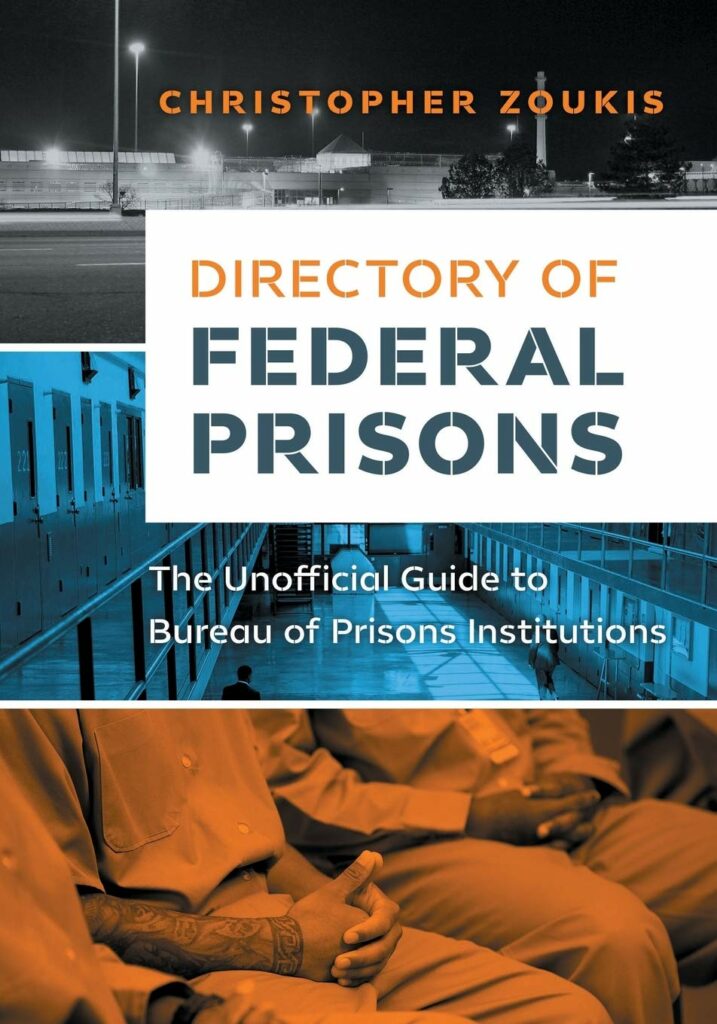
Federal Prison Handbook
The Federal Prison Handbook by Christopher Zoukis is the definitive guide to surviving incarceration in federal prison. This prison book teaches individuals facing incarceration, prisoners already inside, and their friends and family everything they need to know to protect themselves and their rights.
Compiled by Chris Zoukis, who has first-hand experience with the federal prison system, this book about federal prison provides detailed counsel regarding how to serve time. His insider’s view of this unknown world guides inmates through the mental stresses of confinement.
Equally as important, he keeps readers physically safe by explaining how to avoid the near-constant conflicts found inside federal prisons.
In detailed chapters broken down by topical areas, this book about prisons helps readers discover:
- What to expect on your first day in prison
- How to greet cellmates for the first time
- What to do about sexual harassment or assault
- The best ways to avoid fights and options that provide the greatest protection if a fight cannot be avoided
- Medical, psychological, and religious services
- How to communicate with the outside world through telephones, computers, and mail.
- What you can buy in the official commissary and the underground economy
- How to avoid scams, schemes, theft, and other problems
- Comprehensive analysis of Federal Bureau of Prisons policy and regulatory guidelines
- And much more!
Importantly, this prison book provides detailed instructions on how prisoners can protect their rights. The author is a college-educated prisoner who has fought extensively to preserve his rights and the rights of other prisoners.
Incarceration can be cruel to prisoners and their loved ones. Know what to expect and make the best of this time by staying safe, remaining safe, and building a life behind bars.
Learn more about the Federal Prison Handbook and how to order here.
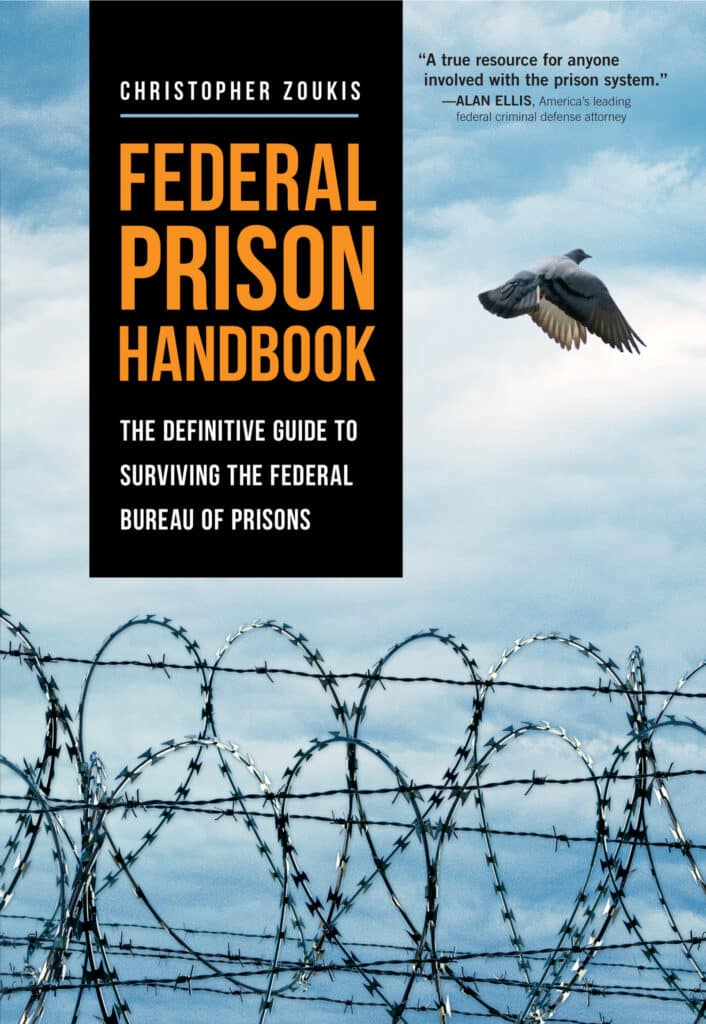
Prison Education Guide
Prison Education Guide, by Christopher Zoukis, is the fourth in a series of books by Prison Legal News Publishing.
The most comprehensive guide to correspondence programs for prisoners available today, this exceptional book provides the reader with step-by-step instructions to find the right educational program, enroll in courses, and complete classes to meet their academic goals.
Perfect for the incarcerated student who lacks Internet access or the ability to attend education classes in person, Prison Education Guide is the latest and best resource on the market for the incarcerated nontraditional student. It includes a detailed analysis of the quality, cost, and course offerings of all college correspondence programs available to prisoners.
When so many academic opportunities in prisons have been eliminated, this book is an invaluable re-entry tool for prisoners who seek to further their education while incarcerated and help them prepare for life and work following their release.
Learn more about the Prison Education Guide and how to order here.
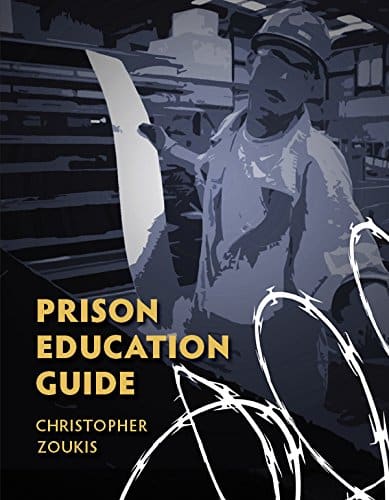
The Habeas Citebook
The Habeas Citebook: Ineffective Assistance of Counsel is designed to assist pro se prisoner litigants advance claims of ineffective assistance of counsel. This is the most common claim presented in post-conviction, habeas corpus proceedings. This book about prisons also helps prisoners raise viable claims for habeas corpus relief.
This prison book cites hundreds of published and unpublished cases from the United States Courts of Appeals and United States District Courts. Federal courts have granted habeas relief in each of these profiled cases.
The Habeas Citebook breaks down ineffective assistance of counsel cases into 40 categories, including:
- Failure to Investigate
- Trial Ineffectiveness
- Conflicts of Interest
- Misadvice
- Guilty Plea Coercion
- Failure to Communicate a Plea Offer
- Sentencing Ineffectiveness
- And much more!
The Habeas Citebook is an essential resource for those examining former counsel’s performance. Additionally, this prison book helps develop well-supported claims of ineffective assistance of counsel.
The Habeas Citebook also contains extensive resource information for the prisoner putting together a habeas petition or other collateral attack, including various rules and procedural codes in their entirety, sample briefs, and informed advice on procedural matters.
As one would expect from a text published by Prison Legal News Publishing, The Habeas Citebook is a quality, well-researched resource for both prisoners and attorneys alike.
Learn more about The Habeas Citebook and how to order this book about prison here.
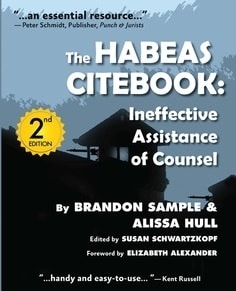
College for Convicts
College for Convicts examines a wealth of studies by researchers, correctional professionals, and educators. These studies come to an irrefutable conclusion: provide education to prisoners, and they won’t return to crime.
American prisons incarcerate about 2.3 million men and women. This equates to about 25 percent of the world’s prisoners. This costs American taxpayers $70 billion per year. Up to 80 percent of prisoners return to jail within 3 to 5 years of release from custody.
Recidivism rates (the number of released prisoners who return to prison) are proven to drop dramatically with each additional level of education attained. A 0 percent recidivism rate is possible with advanced education. Educating prisoners doesn’t only save taxpayers money; it also reduces crime rates and improves our families and communities.
College for Convicts presents a workable solution to America’s over-incarceration and recidivism problems. This prison book demonstrates that although controversial, great fiscal benefits arise when even modest sums are spent educating prisoners instead of dedicating exponentially higher resources to confining them.
According to Christopher Zoukis, “Not only does education change lives, but when used as a crime control strategy, it is the most cost-effective, proven method of reducing recidivism. The discussion concerning if prisoners deserve to receive an education behind bars should be tabled in favor of a discussion concerning how to improve public safety. The end goal of corrections is enhanced public safety, not enhanced punishment for punishment’s sake.”
“Incarcerated author Zoukis gives excellent examples to demonstrate that the U.S. would benefit from higher education for inmates by preparing them for life after prison. The author cites statistics showing prisoners with higher education have a much lower recidivism rate, reducing prison overcrowding and saving society billions. The book ends with important appendixes on the FBP’s position on becoming pen pals with prisoners, funding, free books, & more. A strongly suggested purchase. Highly recommended. All public & academic levels/libraries.”
— M. G. Meacham, Valdosta State University
Read More Reviews on Amazon, McFarland Books, Huffington Post, and Goodreads.
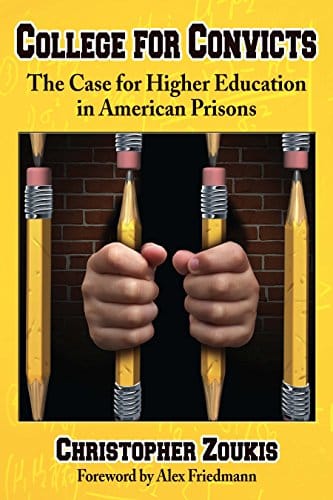
Published Aug 31, 2016 by Christopher Zoukis, JD, MBA | Last Updated by Christopher Zoukis, JD, MBA on Aug 6, 2023 at 1:51 pm


